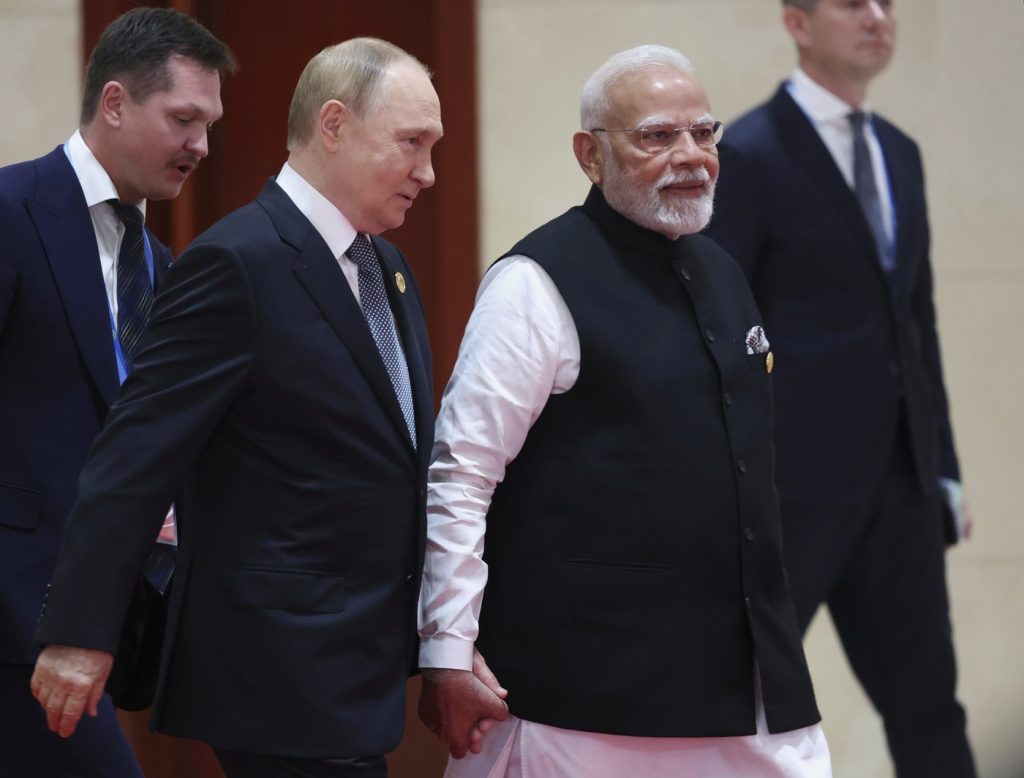On September 1, 2025, Indian Prime Minister Narendra Modi and Russian President Vladimir Putin met on the sidelines of the Shanghai Cooperation Organization (SCO) summit in Tianjin, China. This encounter highlighted the strengthening of ties between India and Russia amid growing tensions between New Delhi and Washington due to India's purchase of discounted Russian oil.
During the meeting, Modi described the partnership with Russia as "special and privileged." Putin referred to Modi as a "dear friend" and emphasized the long-standing, trusting relationship between the two nations, stating, "Russia and India have maintained special relations for decades. Friendly, trusting. This is the foundation for the development of our relations in the future." Putin's remarks underline the bipartisan nature of this relationship, which he claims is supported by the majority of citizens in both countries.
Putin has plans to visit India in December for the 23rd annual summit between India and Russia, as indicated by Yuri Ushakov, his foreign affairs adviser. Modi utilized the SCO meeting to express support for peace initiatives aimed at resolving the ongoing conflict between Russia and Ukraine, urging relevant stakeholders to pursue constructive paths forward. "To end the conflict soonest and establish peace permanently, we need to find out a way. It’s a call of the entire humanity," Modi stated.
The talks included a one-on-one session lasting nearly an hour, where the two leaders reportedly discussed bilateral issues in an Aurus limousine, a high-end vehicle Russian President Putin commonly uses during international travels. This meeting came on the heels of U.S. President Donald Trump imposing an additional 25% tariffs on Indian imports—a move aimed at retaliating against India's continued Russian oil imports. Such tariffs raised the overall duties on Indian imports to a staggering 50%.
The U.S. has consistently cautioned India against purchasing Russian crude, which officials claim helps sustain Moscow's financial revenues to support its military actions in Ukraine. In response, India has maintained that these imports are critical to fulfilling the energy needs of its population, which numbers approximately 1.4 billion. This relationship with Russia has been historically grounded, with Modi visiting Moscow twice in the previous year to negotiate matters related to bilateral cooperation.
With the ongoing geopolitical landscape shifting, particularly after the Ukraine conflict, trade volume between India and Russia has surged, reaching an all-time high of $68.7 billion in the financial year 2024-25. This figure is largely driven by energy cooperation, where imports from Russia total approximately $64 billion while Indian exports are around $5 billion. There are aspirations to elevate trade to $100 billion by 2030.
India's increasing reliance on Russian oil marks a significant shift in its energy sourcing strategy, which traditionally favored Middle Eastern suppliers. Currently, Russia accounts for around 37% of India's total oil imports. This pivot underscores the growing importance of energy cooperation between India and Russia, reinforced by geopolitical dynamics whereby Western nations have reduced their engagement with Russian exports.
International affairs expert Sreeram Sundar Chaulia noted that Modi's meeting clearly illustrated India’s commitment to its traditional strategic alliances while showcasing its ability to maintain a diverse and autonomous foreign policy. Chaulia also remarked that the current strains in U.S.-India relations may be a temporary setback, suggesting that India aims to balance its partnerships with both Russia and the United States as part of a multi-alignment strategy.











